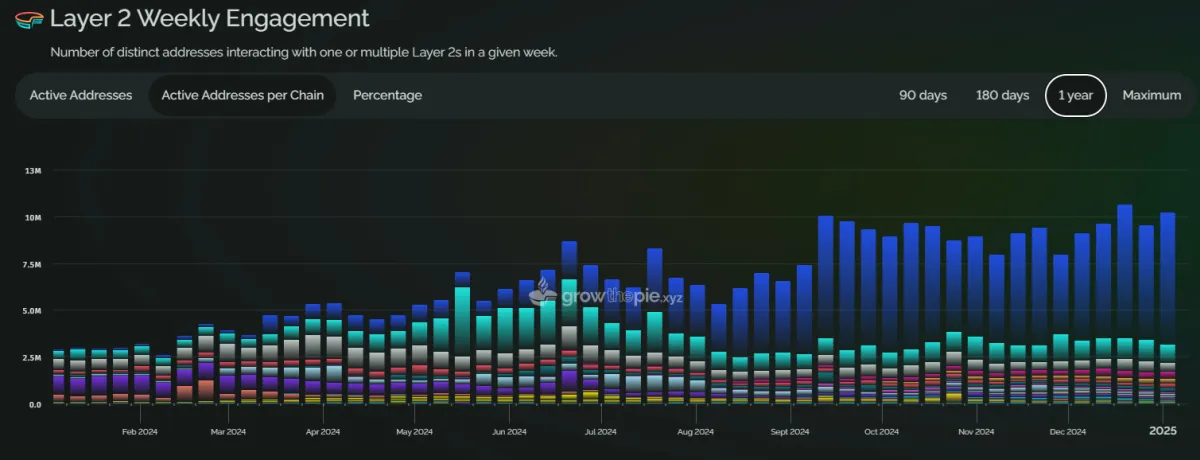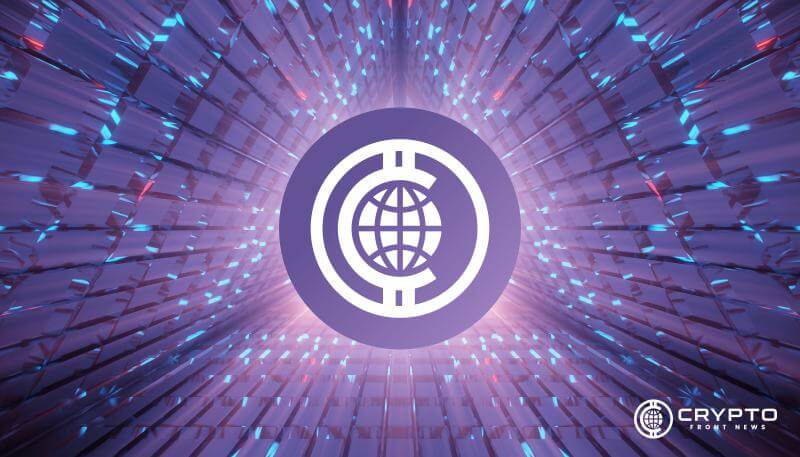Activity on rollups and other L2 networks reached new all-time highs. The traffic on L2 is more than 4.5 times higher than Ethereum transactions, signaling a permanent shift to scalable chains.
L2 chains, led by Base, Arbitrum, and Optimism, invite more than 4.5 times the traffic of Ethereum (ETH). On the main L1 chain, transactions stabilized around 1.16M, shifting toward high-value stablecoin transfers, ETH movements, and fewer swaps or NFT activities.

More of the complex transactions shifted to L2, where each chain holds a specific profile. DeFi activity and liquidity from stablecoins has accumulated to Arbitrum and a handful of top chains, drawing in users for easier DEX swaps.
As a result, L2 activity has posted new records for months. On a weekly basis, L2 activity passed the 10M users milestone, with just 1.96M for Ethereum on a weekly basis.
Users are active in the Ethereum Ecosystem – Last weeks stats:
Over 10,000,000 Addresses interacted with 1 or more Layer 2.
Over 1,960,000 Addresses interacted with Ethereum Layer 1. pic.twitter.com/eMXlz3Yyk2
— growthepie.xyz 🥧📏 (@growthepie_eth) January 6, 2025
While Base remains the leader with high-speed transactions, some of the traffic remains tied to organic DEX trading and DeFi lending on the other top L2 chains. Base also gets a boost from CbBTC traffic, while also accumulating $3.49B in value locked.
Stablecoins are also one of the drivers of L2 adoption. In the first days of 2025, L2 held more than $11B in bridged or native stablecoins, where Arbitrum was the leader with $6.35B. Base was in second place, with $3.5B worth of stablecoins.
The rising trend reflects the strong baseline from Arbitrum, but most of the expansion still comes from Base. The chain is among the top carriers of DeFi, through its version of Uniswap and the Aerodrome high-liquidity DEX. Arbitrum is close behind based on DeFi activity, reaching $33.6M on a daily time frame.
Most L2 chains slowed down significantly after the end of their airdrop mining activity. Returning to organic traffic has been a struggle for multiple chains. Base is still not officially preparing for an airdrop, though there are still expectations for a native token in the future.
L2 chains grow based on specialized activities
Linea, while carrying smaller traffic, remains instrumental for L2 activity in NFT swaps and decentralized social media. Optimism serves as an all-purpose utility chain, while ZKSync Era has the biggest share of simple token transfers.
Arbitrum is the biggest hub for cross-chain activity, with more than $15M on a daily basis. Overall, L2 do not communicate between chains, but rely on bridging and flows to and from Ethereum.
Additionally, dozens of smaller networks aim for specialized tasks, such as gaming or a specific DEX. However, newer networks may lack liquidity, and older ones may be unwilling to become interoperable.
Growing L2 traffic leads to fee and block space competition
The growing traffic also makes L2 more expensive, with regular spikes in rent paid to Ethereum. While the rent is small compared to Ethereum’s block production incentives, there is a shift from the previous months of near-zero payments. To compare, Base at one point paid no more than $3,000 for its activity, while a recent spike led to $93,000 in daily rent paid to Ethereum.
The increased on-chain activity means chain operators may choose how to post to Ethereum. Data shows Arbitrum switches between blobs and calldata, depending on which one is cheaper at the moment. However, this L2 activity actually takes up block space on Ethereum, making regular transactions more expensive.
Ethereum transactions are still more expensive at $1.10, with regular price spikes for specialized tasks. Arbitrum retains $0.09 per transaction, though even L2 are not offering virtually free transfers. However, Arbitrum swaps can go as low as $0.27, while Ethereum DEX deals can cost $21.38 without special priority or additional block-builder payments.
L2 chains retain real economic activity and the top ones show robust demand. However, the L2 narrative remained subdued. A total of 127 high-profile chains were launched, each competing for either niche or mass activity.
Land a High-Paying Web3 Job in 90 Days: The Ultimate Roadmap








